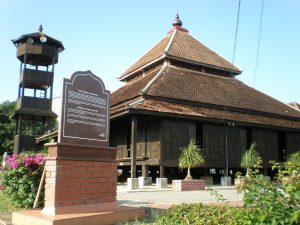A new controversy has erupted in the Malaysian state of Kelantan. The state government has declared that after a careful study it will decide how to make Main Puteri, an indigenous Kelantanese dance form, Shariah compliant by “correcting” parts that it considers “un-Islamic.” Only then will it be allowed for public entertainment.
Main Puteri, a century old traditional and folk ceremony, has been used as a healing therapy for physical and mental illnesses.
The debate about Shariah and performing arts has been going in Malaysia for a long time. Many traditional dances and dramas remain banned because of “un-Islamic” elements.
Since 1990, Kelantan, considered to be a part of the conservative Malay heartland, has been ruled by the Islamic Party of Malaysia (PAS), which advocates the supremacy of Shariah and has implemented a strict interpretation of Islamic Law in Kelantan and two other states it rules.
PAS’s most controversial decision has been banning the performance of syncretic Malay theatrical and dance forms such as Wayang Kulit, Mak Yong, Dikir Barat, and Main Puteri.
However, in 2019, the party lifted a more than two-decade-old ban on Mak Yong, a traditional dance-drama form, with the caveat that it must adhere to Shariah-compliant requirements and guidelines. Mak Yong was banned because of its animist and Hindu-Buddhist roots despite UNESCO declaring in 2005 it a “Masterpiece of the Oral and Intangible Heritage of Humanity.”
Under the new guidelines, all performers in Mak Yong need to be fully clothed and there must be no element of worship in the performances.
Recently, State Community Unity, Culture, Heritage, and Tourism Committee chairman Maj. (R) Datuk Md Anizam Abdul Rahman said a detailed study of Main Puteri was needed as some aspects of the art form seem to have elements that are unsuitable and run contrary to Islam.
“The elements which are not Shariah-compliant need to be corrected. God willing once we have this cleared, Main Puteri will be back for public viewing,” he said.
However, the announcement has triggered a raging debate on social media at the PAS-led government’s attempt to “Arabize” Malays, whose culture and language is deeply rooted in elements of Hinduism and Buddhism, which are very much prevalent in Malay customs and traditions.
A user named shawnwork on Reddit wrote: “You are killing off your culture for an Arabian one. I won’t be surprised if one day Malays don’t have their own culture.” Another Redditor said: “Islamic governments like in Kelantan seeks to gradually eliminate traces and remnants of Hindu/Buddhist influence in favor of Arabization.” He even said that attempts are being made to remove Sanskrit words and Hindu religious terms from the Malay language. He cited some examples: “guru” is a Hindu term for spiritual and religious teacher but “cikgu” is being increasingly preferred. “Neraka/naraka” is a Sanskrit term for hell but “Jahannam” is becoming more prevalent. He said even the traditional Malay Eid greeting is changing, with people favoring the usage of “Eid Mubarak” over “Hari Raya.”
Eddin Khoo, founder of the cultural organization Pusaka, dismissed as “irrelevant” the Kelantan government’s attempt to make Main Puteri acceptable for the general public.
“It is a community ritual and a traditional and therapeutic form. It belongs to the community, inspired by the community and performed by and for the community… All these government interventions into the practice of culture in the state or communities are very disruptive and governments shouldn’t be involved in the first place,” Khoo said.
Some did defend the government move, however. Twitter user @yuyu said: “These dances contain chants and animism, which contradict Islamic belief.”
Asif Ullah Khan is a long-time journalist who has worked for The Times of India, Khaleej Times, and The Brunei Times.

































